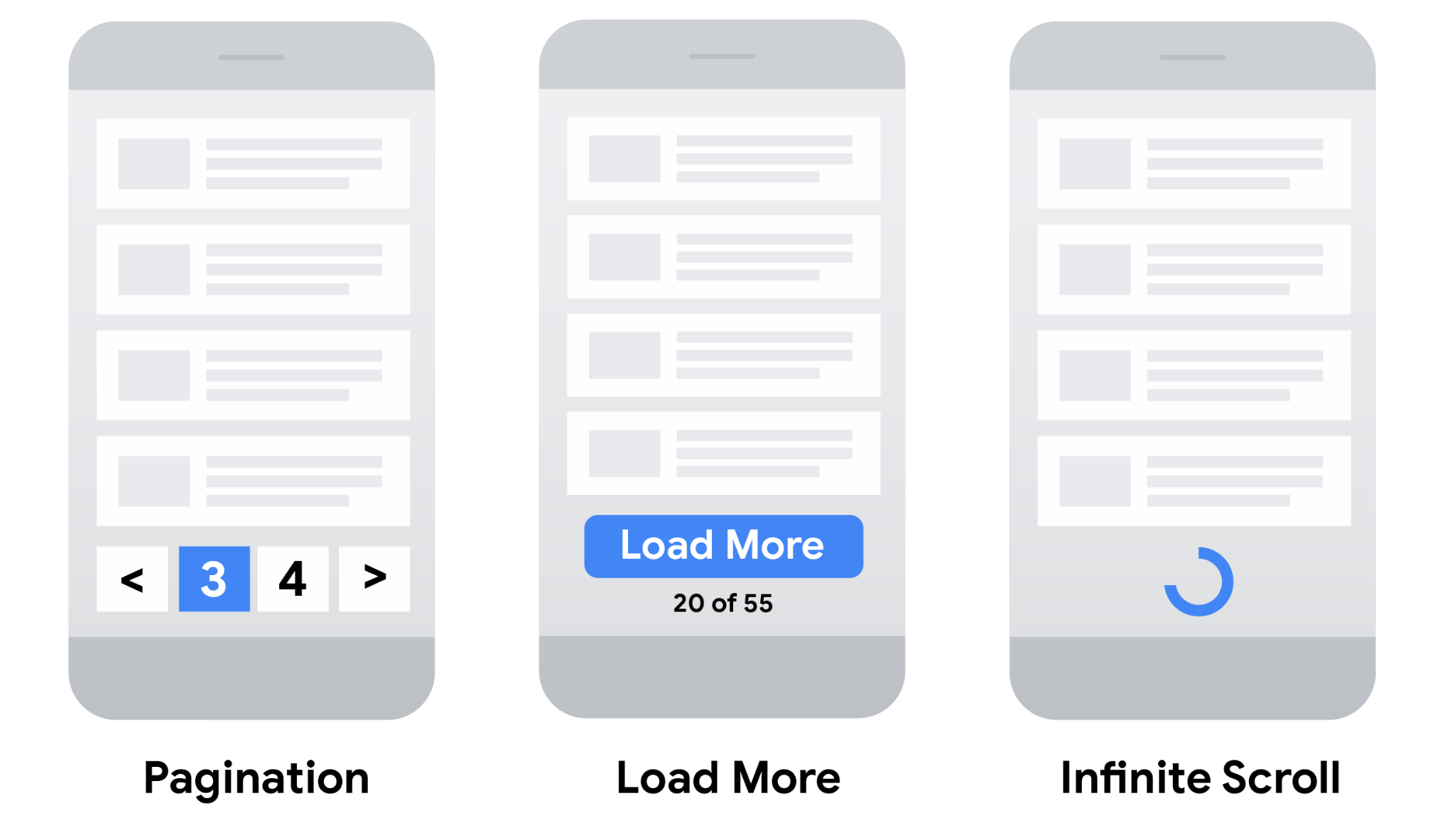分页和增量加载以及它们对 Google 搜索的影响
您可以通过显示部分搜索结果来提升网页性能,从而改善网站用户的体验,但您可能需要采取措施,确保 Google 抓取工具能够找到您的所有网站内容。
例如,在电子商务网站上,当用户使用搜索框进行搜索后,可以向用户显示一部分可以购买的商品。这是因为完整的匹配结果可能太多,无法在一个网页上显示,或者需要的检索时间过长。
除了搜索结果,您还可以在电子商务网站上加载以下内容的部分结果:
- 链接到不同商品类别的网页(其中包含了对应类别的全部商品)
- 网站在一段时间内发布的博文或简报标题
- 商品网页上的用户评价
- 博文的评论
让网站以增量方式加载内容来响应用户操作,就可以通过以下形式使用户受益:
- 改善用户体验,因为初始网页加载速度比一次性加载全部结果快。
- 减少网络流量,这对移动设备而言尤为重要。
- 减少从数据库或类似来源检索到的内容数量,提高后端性能。
- 避免因列表过长、达到资源上限而导致浏览器和后端系统出错,进而提高可靠性。
为网站选择最佳用户体验模式
要显示某个较大列表的子集,您可以选择不同的用户体验模式:
- 分页:用户可以使用“下一页”、“上一页”和页码等链接在不同网页之间进行导航,一次显示一页结果。
- 加载更多:点击此按钮,用户即可展开一组初始的显示结果。
- 无限滚动:用户滚动到网页末尾,即可加载更多内容。 (详细了解有关使无限滚动网页便于搜索的几项建议)。

在选择最适合您网站的用户体验时,请参考下表。
| 用户体验模式 | |||
|---|---|---|---|
| 分页 |
|
||
| 加载更多 |
|
||
| 无限滚动 |
|
||
Google 如何针对不同的策略编制索引
为您的网站和搜索引擎优化 (SEO) 计划选择最合适的用户体验策略后,请确保 Google 抓取工具能够找到您的所有内容。
例如,您可以使用指向电子商务网站上新网页的链接,或使用 JavaScript 更新当前网页,从而实现分页。“加载更多”功能和无限滚动模式通常使用 JavaScript 实现。在抓取网站以寻找要编入索引的网页时,Google 通常会抓取在 <a> 元素的 href 属性中找到的网址。Google 的抓取工具不会“点击”按钮,通常也不会触发需要用户操作才能更新当前网页内容的 JavaScript 功能。
如果您的网站使用 JavaScript,请遵循 JavaScript 搜索引擎优化 (SEO) 最佳实践。 除了最佳实践,例如确保网站上的链接可被抓取,您还应考虑使用站点地图文件或 Google Merchant Center Feed,帮助 Google 找到您网站上的所有商品。
实现分页时的最佳实践
若要确保 Google 能够抓取您的分页内容并将其编入索引,请遵循以下最佳实践:
依序链接网页
为确保搜索引擎理解分页内容的网页之间的关系,请使用 <a href> 标记在每个网页上添加指向下一页的链接。这有助于 Googlebot(Google 网页抓取工具)找到后续网页。

此外,还可以考虑从某集合中的各个网页链接回该集合的第一页,向 Google 强调这是该集合的起始页。这样可以告知 Google,该集合中的第一页可能比其他网页更适合用作着陆页。
正确使用网址
-
为每个网页提供唯一网址。
例如,添加
?page=n查询参数,因为 Google 会将分页序列中的网址视为不同的网页。 - 不要将分页序列的第一个网页用作规范网页。 应为每个网页提供各自的规范网址。
-
不要对集合中的页码使用网址片段标识符(网址中
#后面的文本)。 Google 会忽略片段标识符。如果 Googlebot 看到下一页的网址只有#后面的文本不同,则认为它已检索该网页,因此可能不会跟踪该链接。 - 考虑使用预加载、预连接或预提取功能,改善用户进入下一页时的体验。
避免将应用过滤器的网址或排列顺序不同的网址编入索引
对于较长的结果列表,您的网站可能支持应用过滤器或者按不同的条件对结果进行排序。例如,您可能支持对网址使用 ?order=price,以返回按价格排序的同一结果列表。
为避免将同一结果列表的变体编入索引,请使用 noindex robots meta 标记阻止 Google 将不需要的网址编入索引,也可以使用 robots.txt 文件阻止 Google 抓取特定格式的网址。
